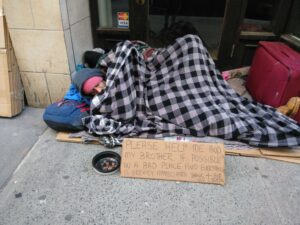People are upset over the homelessness problem in American cities. Unfortunately, however, all too many of them are not interested in adopting the solution to the problem, which is twofold: (1) repeal zoning laws and (2) repeal minimum-wage laws.
I grew up in Laredo, Texas, which is located on the U.S.-Mexico border. In the 1950s, Laredoans were told that we were living in the poorest city in the United States measured by per capita income.
There was no doubt that there was lots of poverty in Laredo. I have recollections of seeing people living in shacks.
But there was one important phenomenon about living in the poorest city in the United States: There was no homelessness. That is, there was no one living on the streets or in their cars, as we see in many American cities today.
Now, think about that for a moment. People say that poverty is the cause of homelessness. But if that’s the case, why wasn’t there any homelessness in Laredo?
The answer is: At that time, there was was no zoning in Laredo. Anyone could establish low-income housing anywhere he wanted, including such things as trailer parks, low-priced rental units, and multiple-family housing.
Thus, everyone was able to find housing at some price.
I should point out that Laredo also had public-housing units (which, ironically, had been started by my grandfather). But even if the government had not entered into the housing market, there still wouldn’t have been a homelessness problem in Laredo.
When I returned to Laredo after graduating from law school, one of our legal clients was a man who specialized in building and providing low-cost housing for the poor — for a profit. He would buy his building supplies in Mexico, where he could get them at a much lower price, bring them back to Laredo, and use them to build low-cost motels. His motel rooms were oriented toward the very poor. They were clean and simple. People could rent the rooms on a daily, weekly, monthly, or yearly basis. He always had a very high occupancy rate.

Licensed under Creative Commons Attribution-Share Alike 4.0 International license.
He was free to situate his rental units anywhere in town. That same freedom applied to mobile-home parks. That’s because there were no zoning laws.
That same freedom does not apply in cities where there is a homelessness problem today. I guarantee you: Show me a city that has a big homelessness problem and I will show you a city that has zoning.
To protect citizens’ property values from such things as mobile-home parks and low-price housing, local officials enacted zoning laws. They figured that they could abolish “blight” by simply using the force of zoning laws to make low-cost housing illegal. What they ended up doing is producing a massive homelessness problem.
Today, much of the anger that arises from the homelessness problem is directed toward the homeless. But what are they supposed to do — commit suicide? They can’t afford to rent a place in which to live because zoning laws have knocked out low-priced housing within the city.
Moreover, minimum-wage laws prevent them from getting a job at a wage that is lower than the government-mandated minimum. It would be one thing if they were free to get a job at less than the governmentally set minimum wage. In that case, one could legitimately say, “Get a job, you bum.” But when their labor in the marketplace is valued by employers at less than the artificially set minimum wage, the state has locked them out of the labor market with its minimum-wage law. Thus, telling them to “Get a job, you bum” is nothing less than cruel and abusive. And if they can’t get a job, then how are they supposed to be able to pay rent for housing, especially when rents are exorbitantly high because of zoning laws?
In the 1926 case of Village of Euclid v. Ambler Reality Co., the U.S. Supreme Court, in a 6-3 decision, upheld the constitutionality of zoning, which at that time was a relatively new phenomemon. That’s unfortunate. If the Court had instead declared zoning to be unconstitutional, which it should have, American cities would not have a homelessness problem today.
NOTE: Thanks to Kate D. for inspiring this article.



